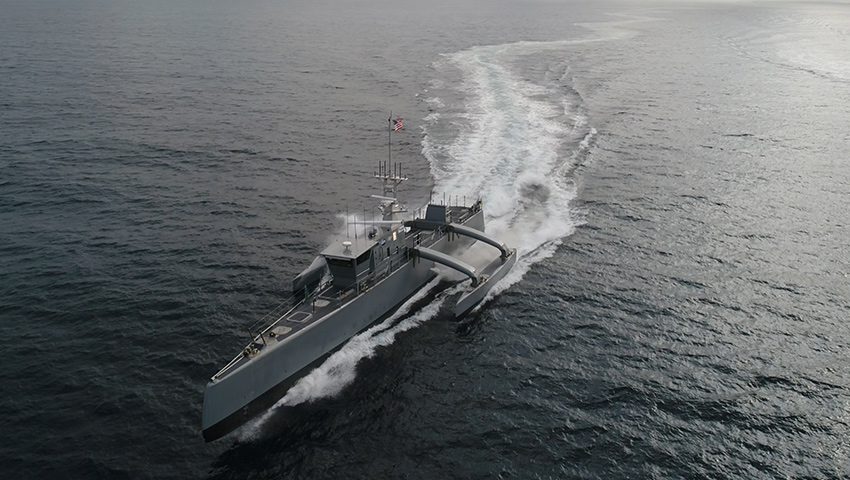Leidos has announced that the Office of Naval Research’s (ONR) Medium Displacement Unmanned Surface Vessel (MDUSV), Sea Hunter, has successfully navigated autonomously from San Diego to Pearl Harbour, Hawaii, and back.
To continue reading the rest of this article, please log in.
Create free account to get unlimited news articles and more!
The Class III Sea Hunter was designed and developed as part of a partnership with the US Defense Advanced Research Projects Agency (DARPA) and the ONR to develop a prototype, unmanned submarine tracking vessel with the capability to autonomously patrol the sea for months on end with minimal logistical support.
Supporting the successful autonomous testing process, the vessel completed a 6,044 nautical mile round trip, completing a period of extended test phase, which includes a series of 'very short' boardings by personnel from an escort vessel in order to monitor electrical and propulsion systems.
Gerry Fasano, Leidos Defense Group president, welcomed the successful testing process, saying, "The recent long-range mission is the first of its kind and demonstrates to the US Navy that autonomy technology is ready to move from the developmental and experimental stages to advanced mission testing."
Leidos confirmed that Sea Hunter will continue a period of 'long duration and mission package testing' throughout 2019, with the company receiving a potential US$43.5 million contract to continue the development of Sea Hunter II, which is currently under construction in Mississippi.
"Our talented team of engineers, scientists and analytical experts have decades of experience that will allow us to deliver a second highly autonomous vessel designed to keep our servicemen and women safe while monitoring the maritime environment," said Fasano.
Sea Hunter is described as a "a highly autonomous unmanned ship that could revolutionise US maritime operations" and "a new vision of naval surface warfare", the drone was developed through the agency’s ASW Continuous Trail Unmanned Vessel (ACTUV) program.
The sister ship to Sea Hunter will be "evolved based upon lessons learned during the first build, evolving mission requirements and further development of autonomy enhancements".
"Our talented team of engineers, scientists and analytical experts have decades of experience that will allow us to deliver a second highly autonomous vessel designed to keep our service men and women safe while monitoring the maritime environment," said Fasano.
The US Navy's ACTUV program aims to explore the US Navy’s capabilities to engage in missions across thousands of kilometres of range and months of endurance, without the need for a human presence in the vehicle, and under a sparse remote supervisory control model. The program is structured around three primary goals:
- Explore the performance potential of a surface platform conceived from concept to field demonstration under the premise that a human is never intended to step aboard at any point in its operating cycle;
- Advance unmanned maritime system autonomy to enable independently deploying systems capable of missions spanning thousands of kilometres of range and months of endurance under a sparse remote supervisory control model; and
- Demonstrate the capability of the ACTUV system to use its unique characteristics to employ non-conventional sensor technologies that achieve robust continuous track of the quietest submarine targets over their entire operating envelope.
The primary focus of ACTUV is to develop an unmanned vessel optimised to robustly track quiet diesel electric submarines, at a time when 50 per cent of the world's submarines are expected to be operating in the Indo-Pacific region by 2030.
Fasano added, "We're excited to showcase our unique and innovative capabilities for a program of great national significance."
Leidos is a Fortune 500 information technology, engineering, and science solutions and services leader working to solve the world’s toughest challenges in the defence, intelligence, homeland security, civil and health markets.

 Login
Login







